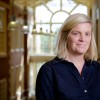In the fall of 2024, we were approached by Mary Kate Mauney, a Public History graduate student at UNC Greensboro, with an exciting research proposal involving the Hephzibah Baptist Church records. She wrote:
“Freedom From, Freedom To” will be a digital history project and commemorative event that unveils the lives of 16 free people of color who were all members of Hephzibah Baptist Church in Wake County, North Carolina. Through archival analysis of Hephzibah’s church minute book, along with the exploration of census records, marriage licenses, and wills, this project highlights an understudied community and provides insight into what life was like for free people of color in the state during the 19th century.”
We were immediately excited by the depth of Mary Kate’s research and the opportunity to collaborate. Our initial conversations began with an onsite visit, where we discussed the use of our From the Page transcription platform and explored possibilities for building a website on the Wake Forest University domain using WordPress.
Over the course of her project, Mary Kate met with several members of our team—including Emily, Kyle, Kevin, and myself—to gather insights and guidance. Her work centered on one of the many digitized church records housed in the North Carolina Baptist Historical Collection, a rich and layered archive within Special Collections & Archives.
Mary Kate made full use of From the Page, a platform we’ve recently adopted, to transcribe church minutes. She further enriched the context of these records through extensive research using census data and other primary and secondary sources.
The final product of her capstone “Freedom From, Freedom To” is an engaging and insightful website that tells the story of the free people of color associated with Hephzibah Baptist Church. It’s a remarkable example of how researchers can engage with our collections, contribute new understanding, and expand the impact of archival materials.

6 Comments on ‘Hephzibah Baptist Church: A Digital History Collaboration’
This is excellent. The use of archival research to uncover little known or unknown information is very important. This is a great collaborative project. Congratulations to everyone involved.
Mary Kate’s project is an excellent use of our Baptist collections and shows what can be done to interpret these records for the public. Thanks to Rebecca, Kevin, Kyle, and Emily for assisting Mary Kate.
This is wonderful, Rebecca and Mary Kate, this is such a great resource! Great job!
This is a good example of how church records can offer the type insight into history that most people would not expect to find.
Congratulations for completing this valuable and unique project.
Thanks to Mary Kate for doing this important research, and to our team for supporting this project. I love to see how our collections are used to surface new insights and connections, especially when it supports a student’s learning experience. Great work!